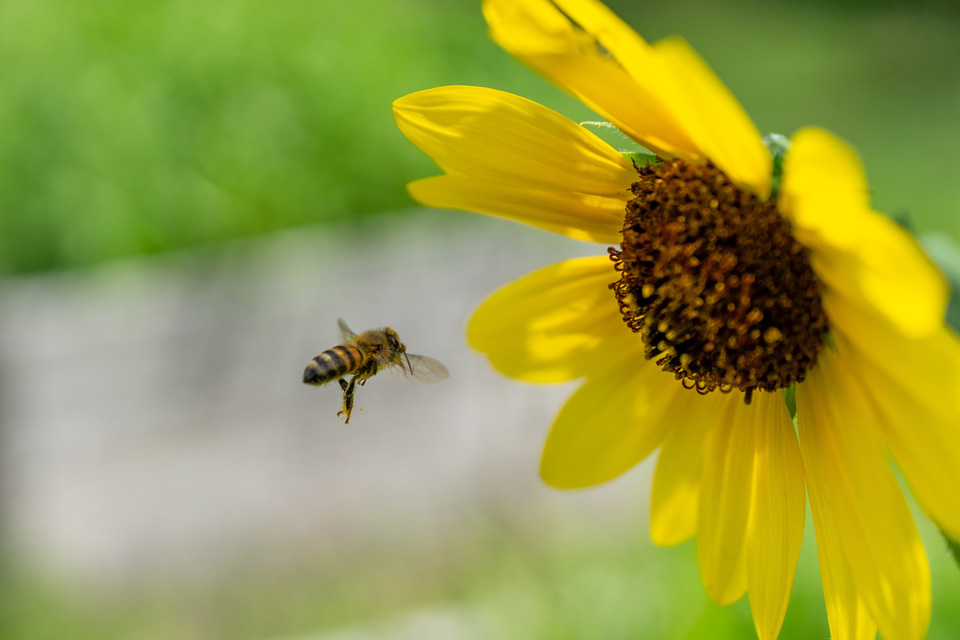- August 2, 2024
Protecting the Pollinators

NIFA includes UTRGV in $5.7M grant to fund pollinator research
By Amanda A. Taylor-Uchoa
RIO GRANDE VALLEY, TEXAS– The bees, wasps and butterflies flitting around your garden may seem like ordinary visitors.
But as pollinators, they are extraordinary, and their role in the health of the world’s ecosystem makes them pivotal life-bringers, one flower at a time.
In the Rio Grande Valley, local pollinators thrive in areas of Tamaulipan thornscrub, a mix of shrubs and native flowering plants, which have dwindled due to agricultural and urban development.
To help restore thornscrub areas and promote pollination, the USDA’s National Institute of Food and Agriculture (NIFA) recently announced more than $5.7 million in grants for funding pollinator research as part of the Pollinator Health: Research and Application program.
UTRGV has been chosen as one of only 10 institutions recognized for this type of research and was awarded a cumulative amount of $299,482 in project funding.
THE PROJECT
The UTRGV project, named “Initial characterization of floral resources used by pollinators in Tamaulipan thornscrub to inform habitat restoration,” is led by principal investigator and UTRGV Associate Professor Julie Mustard, School of Integrative Biological and Chemical Sciences (SIBCS), and associate professor and co-PI Alejandro Fierro-Cabo, who has joint appointment in SIBCS and the School of Earth, Environmental and Marine Sciences (SEEMS).
In this collaborative effort, Mustard will contribute her expertise on insect physiology and behavior and oversee development of the DNA sequence barcodes that can be used to uniquely identify different species of plants.
Fierro-Cabo, an expert on the Tamaulipan thornscrub and plant-animal interactions, will use his experience growing plants for restoration efforts to develop methods for studying plant bloom time, and in general field work.
Mustard said the overall goal of the project is to provide information about how the plants that make up Tamaulipan thornscrub habitat support different types of pollinators.
“Pollinators are important for a healthy ecosystem because they increase the genetic diversity of plant populations. And that makes them more resistant to challenges like disease and climate change,” she said. “The Tamaulipan thornscrub is the native habitat for part of the Rio Grande Valley, but much of it has been destroyed due to agriculture and urban development.”
Fierro-Cabo said the Tamaulipan thornscrub forest is a unique plant association native to the Lower Rio Grande Valley, and through some of the project’s efforts, he hopes for more restoration. Using methods such as plant surveys and documentation, the team can see which types of plants the pollinators prefer, and learn how to protect them.
“The results will inform the choice of species for reforestation, improving the health and diversity of pollinators – as well as the restoration outcomes – by increasing pollinator services to both the thornscrub plant community and agricultural fields,” he said.
RESEARCH AND COMMUNITY IMPACT
As part of the wide scope of the work required in this project, the grant will help support both undergraduate and graduate students to participate in related independent research projects.
“As well as gaining an understanding of the process of science, students will learn about plants and pollinators from the level of individual species to how they interact in the ecosystem. This experience can help them build careers in conservation and ecology and help them find jobs at places like the USDA or Texas Parks and Wildlife,” Mustard said.
And while the overall project does not deal with agriculture directly, some of the research information has the potential to help local farmers.
“Pollinators are essential for production of many of the foods we eat. Flowers must be pollinated to produce many of the foods we eat, such as citrus, strawberries, almonds and more,” Mustard said. “Previous research has shown that having a diversity of pollinators increases crop production.”
Through the work in this ongoing research project, Fierro-Cabo said, he believes more focus will be brought to the Tamaulipan thornscrub, as it is an endangered ecosystem existing in South Texas and northeastern Mexico.
“UTRGV students and the community should understand the importance of tiny insect pollinators in the conservation and restoration of thornforests,” he said.
For more information on the project and to see the list of other projects, visit the link here.

